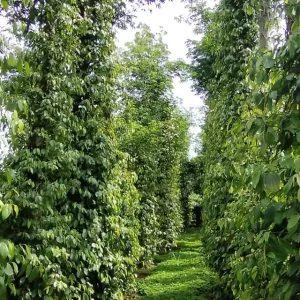Can The World’s Largest Peppercorn Producer Save Its Soils?
Black pepper, a staple in kitchens worldwide, comes largely from Vietnam — but now poor soil health is threatening the industry’s future and researchers are racing to find ways to restore soils and harvests. By: Andrew Wight In Vietnam’s Central Highlands Region, smallholder farmer tend to row after row of strange living towers of Black pepper vines (Piper nigrum), one

Can The World’s Largest Peppercorn Producer Save Its Soils?
Black pepper, a staple in kitchens worldwide, comes largely from Vietnam — but now poor soil health is threatening the industry’s future and researchers are racing to find ways to restore soils and harvests.
By: Andrew Wight
In Vietnam’s Central Highlands Region, smallholder farmer tend to row after row of strange living towers of Black pepper vines (Piper nigrum), one of the earliest and widespread condiments — and in recent decades Vietnam has dominated global production, producing 2.2 tonnes per hectare and over 40 percent of 2020 global production.
Vietnam is also the second largest exporter of robusta coffee, which is also under pressure from acidifying soils and soil borne pests and diseases.
“Both coffee and black pepper are threatened by the same phytopathogenic nematodes and fungi: This consortium of soil-borne pest and diseases interact and damage plantations of both commodities,” Lesueur says, adding that after decades of rampant growth, growers of black pepper and coffee are facing diminishing harvests.

